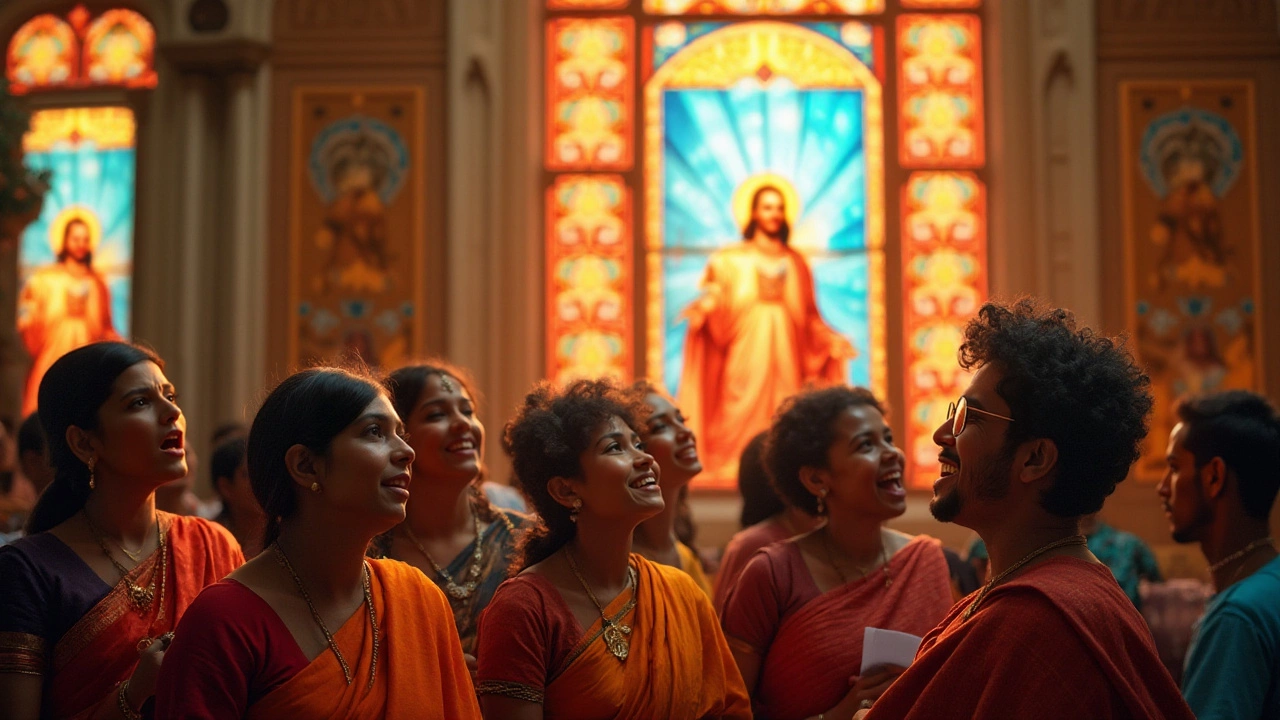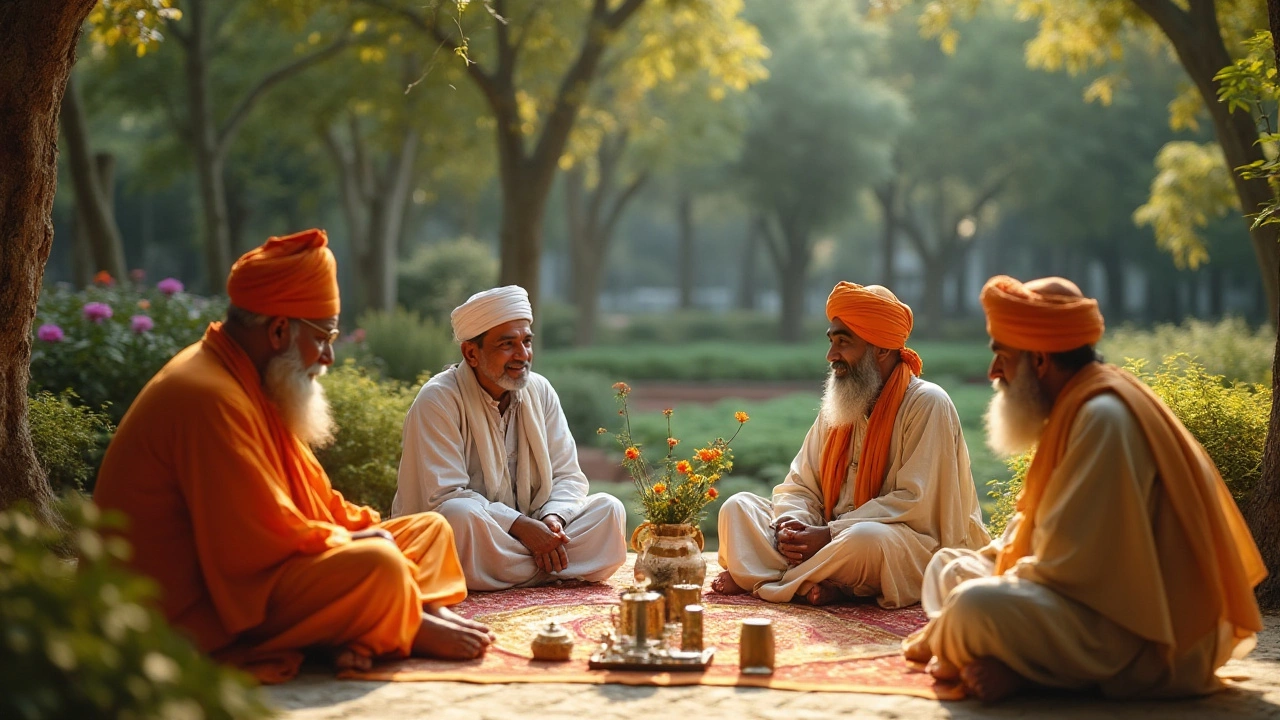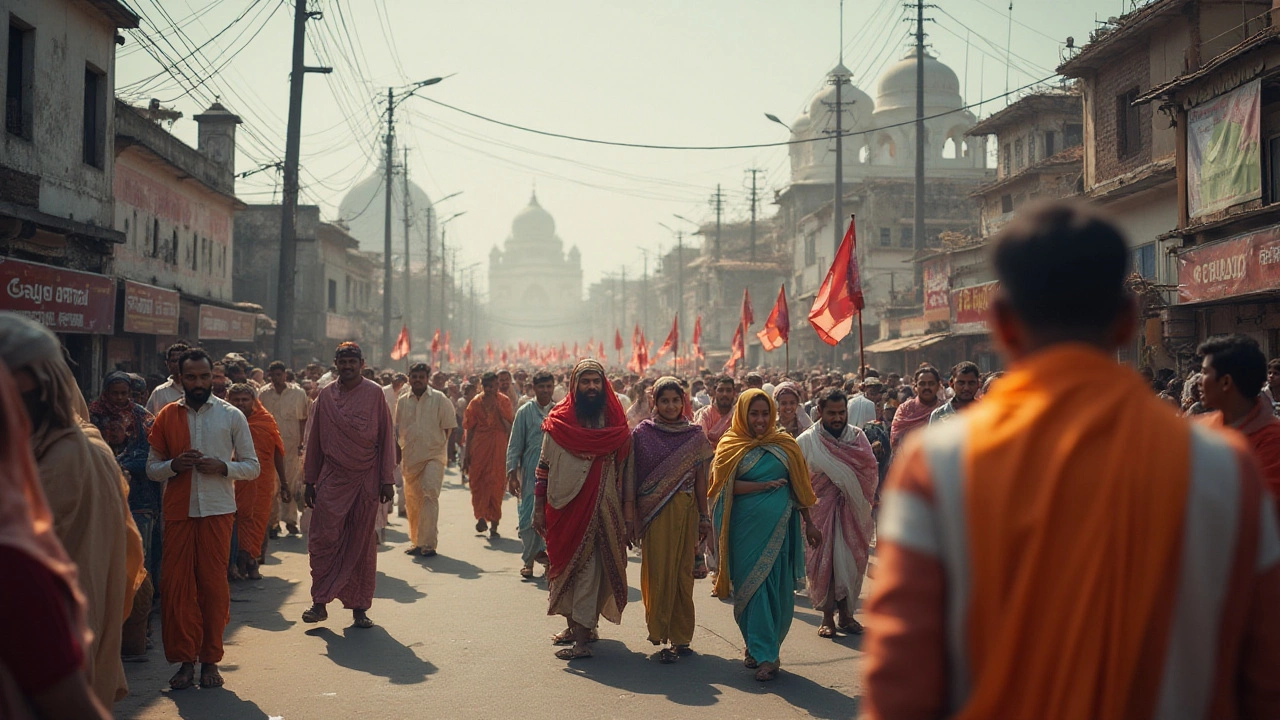Exploring Belief in Jesus Among Indians Today
 Nov, 28 2024
Nov, 28 2024
When the conversation turns to faith and belief systems in India, there is no denying that this ancient land is a confluence of diverse religious ideas and philosophies. Despite Hinduism being the predominant faith, Christianity holds a distinct place, with historical roots tracing back to the arrival of St. Thomas the Apostle around 52 AD. Many centuries later, the life and teachings of Jesus continue to resonate with a sizeable portion of India's population.
Today, India's Christian community, though a minority, contributes vibrantly to the nation's religious mosaic. This piece seeks to uncover how Jesus is viewed within Indian culture, not just among Christians but also how his life influences adherents of other faiths. Understanding the narrative surrounding Jesus in India requires looking at its historical spread and the contemporary landscape that holds varied interpretations of spirituality.
Join me in exploring the rich interplay between tradition, faith, and cultural identity in the Indian context and how Jesus fits into this intricate puzzle of belief systems.
- Historical Context of Christianity in India
- Contemporary Religious Demographics
- Cultural Impact of Jesus on Indian Society
- Interfaith Dialogues and Understanding
Historical Context of Christianity in India
Christianity's presence in India is not a recent development but a saga that stretches over two millennia. According to popular tradition, Christianity was introduced to India by St. Thomas the Apostle, who arrived on the shores of Kerala in 52 AD. This establishes India as one of the first countries to have been exposed to the teachings of Jesus Christ outside of the Middle East. Thomas's arrival is commemorated with a wealth of ancient churches in the region, standing testament to his enduring influence. Indian Christianity took root in a land that was already home to a tapestry of religious practices and philosophies, making it a unique blend of Indian culture and Christian doctrine.
The early Christian communities in India, notably known as the St. Thomas Christians or Mar Thoma Christians, developed distinctly, largely isolated from the Christian developments occurring in the West. These communities aligned themselves with East Syrian or Chaldean traditions, weaving them richly into their Indian cultural context. It wasn't until the arrival of Portuguese missionaries in the 16th century that Catholicism began to spread more widely, reshaping the religious landscape. These efforts were not without resistance, as many local Christians prided themselves on their unique heritage.
The Portuguese influence, reinforced by colonial trade links, made way for a more significant Western Christian presence in various parts of India. The advent of the British Empire later spurred the growth of Protestant Christianity, driven by missionary activities focused on education, health care, and social reform. Educational institutions established by missionaries have produced some of the leading figures in Indian society, illustrating how deeply rooted these communities are in the nation's development. Exploring the Indian Christianity experience reveals a fascinating intertwining of ancient traditions that have withstood the test of time.
"The arrival of Christianity in India not only marks the spread of a great religion but also the intersection of diverse cultures, which has been both enriching and challenging at times." - Dr. Susan Richards, historian and author on religious symbiosis
Remarkably, the spread of Christianity was not merely confined to European conquests or colonial rule. Indian evangelists and local communities played pivotal roles in it. From Serampore in the east to the coastal trade centers in the west, vibrant pockets of Christians emerged, promoting social progress and moral upliftment. Even today, ancient music, architecture, and language from these early Christian communities bear witness to their distinctive integration into the broader Indian identity.
The intricate history of Christianity in India exemplifies a resilient faith that has adapted to local customs while keeping its foundational beliefs intact. Adherents of Jesus in India represent a diverse group, including Catholics, Protestants, and Eastern Orthodox, each contributing uniquely to the patchwork of Indian Christianity. As one explores historical narratives and the indelible impacts on Indian society, it becomes evident how historical interactions have shaped perceptions and acceptance of Christianity, making it a faith as Indian as it is global.

Contemporary Religious Demographics
In today's India, a country known for its spiritual diversity and religious pluralism, the presence of Christianity stands as a testament to a long history of interfaith interactions and the rich tapestry of beliefs that shape the nation's identity. According to the latest census data available up to 2021, Christians comprise about 2.3% of the total population, making them the third-largest religious group in India after Hindus and Muslims. The Christian community is predominantly found in the states of Kerala, Tamil Nadu, Goa, and the Northeastern states like Nagaland and Mizoram, where Christianity gained followers through missionary activities during the colonial era. These regions boast vibrant Christian communities with unique cultural practices and worship traditions that are deeply intertwined with local customs. As a minority, Christians in India have established thousands of educational institutions and healthcare facilities, which have significantly contributed to the social fabric of urban and rural India.
It's interesting to note the diverse denominations within Indian Christianity, ranging from Catholics, Protestants to Syrian Christians, each practicing their faith with distinct liturgical traditions. This diversity is often a reflection of historical influences, such as Portuguese, British, and French colonial impacts, as well as native interpretations that merge Christian beliefs with indigenous spirituality. For instance, Indian beliefs in Jesus are often infused with local cultural elements, making it distinct from Western Christianity. This phenomenon isn't just confined to rural areas; even urban centers like Mumbai and Delhi exhibit a mosaic of practices stemming from various Christian traditions. In the societal domain, Indian Christians have been at the forefront of advocating social justice, gender equality, and educational reforms, emphasizing the role of religion as a force for positive social change.
Interfaith interactions have also played a pivotal role in shaping contemporary religious demographics in India. The dialogue between different communities has encouraged syncretism, leading to mutual respect and understanding among followers of different faiths. This is evident in multi-religious gatherings and celebrations where people from various backgrounds come together, exemplifying India's 'unity in diversity'. According to a Pew Research Center report, 78% of Indians believe in respecting all religions, highlighting an environment where religious harmony is both a tradition and a necessity. This spirit of harmony is essential in maintaining social peace and fostering economic growth in such a pluralistic society.
"The richness of India's religious mosaic lies in its ability to weave a common thread of humanity through diverse beliefs," notes historian Romila Thapar.
Amidst this pluralistic backdrop, the role of religion in India remains pivotal, fueling questions about identity, culture, and faith. The younger generation, with its exposure to global cultures and ideas, is actively redefining what it means to be an Indian Christian, often blending modern values with age-old traditions. This dynamic interplay ensures that Christianity in India is constantly evolving, adapting to the times while still holding onto its core spiritual messages. This adaptability is what keeps the faith vibrant, helping it to remain relevant amid rapid social and technological changes. As India moves forward in the 21st century, its religious landscape will undoubtedly continue to be as dynamic and diverse as its storied past.

Cultural Impact of Jesus on Indian Society
The influence of Jesus in Indian society transcends the boundaries of religion and interweaves with the country's rich cultural tapestry in multifaceted ways. Christianity, introduced to India almost two millennia ago, primarily through Kerala, remains vibrant in various regions such as Goa, the Northeastern states, and parts of Tamil Nadu. Here, the figure of Jesus not only informs religious practices but also significantly shapes cultural identities and societal norms. The impact of Jesus is visible in the architecture of churches, the arts, festival celebrations, and even in popular folklore.
In urban areas, Christian educational institutions and healthcare services, often run by missions, anchor on the teachings of Jesus, emphasizing compassion, service, and the betterment of society. These institutions have built trust across communities, attracting students and patients from all faiths, reinforcing Jesus' influence as a unifying figure. The celebration of Christmas and Easter, once exclusive to Christians, has permeated mainstream Indian culture, becoming occasions for social gatherings and philanthropy across religious lines. This celebration of Jesus' life and message of love and forgiveness showcases an Indian interpretation of inclusivity and cross-cultural respect.
According to Father Cedric Prakash, a Jesuit priest and human rights activist, "The message of Jesus, rooted in love and justice, strikes a deep chord in India, a land deeply spiritual by nature."Literature, both religious and secular, often highlights Jesus as a figure of peace and wisdom, resonating with themes prevalent in Hindu and Buddhist texts. This syncretic blend of religious philosophies fosters a unique Indian spirituality that accommodates a multitude of beliefs and practices.
Beyond religion, Jesus' life and teachings inspire Indian arts, music, and films. Notable works of Indian cinema and television have portrayed stories from the Bible, reaching millions and sparking dialogue on moral and ethical themes. The artistic expression through music, especially in the form of gospel and choral performances, enchants audiences in India’s vibrant music scene. In counter stories often overlooked, Dalits, an oppressed group within the caste system, find in Jesus’ message of hope and equality a powerful tool for social mobilization and personal empowerment. As such, Jesus’ presence in Indian society is not just a religious narrative but a powerful cultural force that shapes social cohesion and progression.
The dialogues between Christianity and Indian traditions continue to open avenues for shared understanding and mutual respect. This intricate relationship between the teachings of Jesus and Indian societies reveals how religious narratives can transcend their origins and take on new meanings in different cultural contexts. This adoption of Jesus' teachings highlights India's propensity for absorbing diverse influences, molding them into something distinctively its own, and enriching its cultural mosaic.

Interfaith Dialogues and Understanding
In a country as diverse as India, interfaith dialogues offer a remarkable platform for fostering understanding and peace among communities with varied religious beliefs. These dialogues have become an essential aspect of India's socio-cultural tapestry, with a primary goal to bridge gaps and reduce misunderstandings between communities like Hindus, Muslims, Christians, Sikhs, Buddhists, and others. The genesis of such dialogue often stems from the necessity to address shared societal issues such as poverty, education, and healthcare while recognizing and respecting religious diversity. One of the noteworthy outcomes of these interfaith conversations is the enhanced collective empathy and solidarity that can transcend religious lines.
Today, many Indian faith leaders actively engage in such dialogues, supported by numerous civil society organizations. These interactions often center around finding common ground, especially in moral and ethical teachings where the figure of Jesus can hold a place even beyond the Christian community. It is well-documented that the teachings of Jesus, focusing on love, compassion, and forgiveness, resonate strongly across different religious beliefs. Notably, figures such as Mahatma Gandhi, though a staunch Hindu, have acknowledged the profound influence of Jesus' teachings on non-violent resistance and peace.
"The message of Jesus, as I understand it, is contained in these words: 'Resist not him that is evil.' I needed to go no further than this beautiful passage to understand the whole order of the world," - Mahatma Gandhi.The modern-day significance of Gandhian philosophy shows how religious teachings can inspire universal change and action. This cross-religious appreciation serves as a testament to the interconnected nature of faiths when interpreted through their core humanitarian values.
Interfaith dialogues also bear the potential for practical solutions in today's complex world. For instance, initiatives like the Parliament of the World’s Religions or local interfaith councils often discuss how religious groups can jointly tackle climate change, poverty, and inequality, illustrating a shift from theoretical discussions to impactful actions. Data suggest that regions facilitating regular interfaith interactions report higher communal harmony and lesser incidents of conflict. Discussions about shared challenges encourage communities to pool their resources and strengths in pursuit of common goals, significantly boosting social cohesion.
Case Study: Interfaith Harmony Week
In India, various interfaith initiatives are commemorated by events such as the World Interfaith Harmony Week. This week, observed in February, showcases cultural events, seminars, and workshops that unite people from all walks of life. Initiatives like these foster a sense of unity and promote the idea that despite diverse theological perspectives, there exists a magnetic pull towards collective good. Activities during this week often spotlight shared religious narratives and figures, like Jesus in Christianity, emphasizing their teachings that overlap with other religious tenets, such as kindness, selflessness, and love. This exchange provides insights into how Indian Christians and followers of other religions can discover commonalities in morality and ethics.In summary, interfaith dialogues in India not only celebrate religious diversity but also seek actionable paths forward in the spirit of cooperation. As we deepen these conversations, there is a growing recognition of the role that Jesus and other spiritual figures can play in strengthening these cross-cultural exchanges. Such efforts invite an awareness that transcends mere tolerance, opening doors to genuine understanding and durable peace.